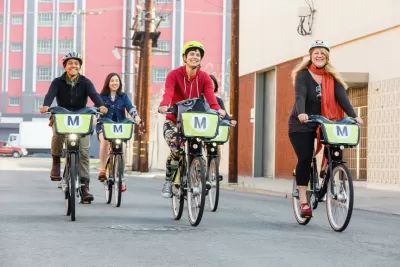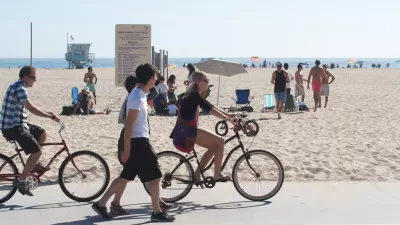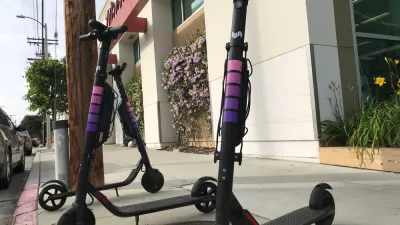One thousand bikes will be available exclusively to Metro passholders who subscribe from July 7 to August 1, when the general public will be able to sign-up. Subscribers will use a single card to access both transit and Metro Bikes. Sponsor needed.

"Metro and the city of Los Angeles today announced [May 25] they will officially launch Metro’s bike sharing program in downtown Los Angeles on Thursday, July 7," writes Dave Sotero for The Source, Metro's blog.
The installation of bike share stations throughout downtown L.A. will begin in early June, with work expected to continue until the stations open to the public on July 7.
The transit connection
What distinguishes Metro Bike (the current name on the bikes, but Metro is looking for a sponsor that will "enable a single company to advertise its products on the bicycles...in downtown L.A. and future expansion planned for Pasadena, the San Fernando Valley, the San Gabriel Valley, Huntington Park, East Los Angeles and elsewhere across the region") is the close connection to transit.
For example, "Metro will become the first major transportation agency in America to offer a single card that allows access to both transit and bike share systems," writes Sotero. A Metro bike share explained by phone that patrons can store two accounts, one for transit and one for bike share on their Transit Access Pass (TAP) card, a smart card with computer chip, similar to the Clipper Card in the Bay Area.
Sotero's article on the launch of Metro Bike Share was also published in Mass Transit Magazine.
How will bikeshare affect transit usage, and vice-versa?
As Planetizen editor James Brasuell noted in a post on a newly published academic survey last December, "earlier studies examined the effects of bike share on car trips, while the new survey focused specifically on transit use." Clearly Metro Bike Share will yield lots of data to understand the nexus between the two modes that will hopefully expand mobility options for both cyclists and transit patrons.
To register for the bike share system, customers can purchase a $20 monthly pass, $40 annual flex pass, or after August 1, a $3.50 walk up pass. Early subscribers receive promotional kits. More information here.
The system will be operated by Bicycle Transit Systems, with bikes and stations provided by BCycle, a unit of Trek Bicycles of Wisconsin.
Metro Bike Share will be Los Angeles County's second bike share program. As posted earlier, Santa Monica's Breeze Bikeshare, with 500 GPS-enabled bikes (that don't require docking stations) opened last November.
Hat tip to L.A. Metro Transportation Headlines
FULL STORY: Metro and city of L.A. to launch bike sharing in DTLA on July 7

Alabama: Trump Terminates Settlements for Black Communities Harmed By Raw Sewage
Trump deemed the landmark civil rights agreement “illegal DEI and environmental justice policy.”

Planetizen Federal Action Tracker
A weekly monitor of how Trump’s orders and actions are impacting planners and planning in America.

The 120 Year Old Tiny Home Villages That Sheltered San Francisco’s Earthquake Refugees
More than a century ago, San Francisco mobilized to house thousands of residents displaced by the 1906 earthquake. Could their strategy offer a model for the present?

Record Temperatures Prompt Push for Environmental Justice Bills
Nevada legislators are proposing laws that would mandate heat mitigation measures to protect residents from the impacts of extreme heat.

Downtown Pittsburgh Set to Gain 1,300 New Housing Units
Pittsburgh’s office buildings, many of which date back to the early 20th century, are prime candidates for conversion to housing.

Trump Administration Could Effectively End Housing Voucher Program
Federal officials are eyeing major cuts to the Section 8 program that helps millions of low-income households pay rent.
Urban Design for Planners 1: Software Tools
This six-course series explores essential urban design concepts using open source software and equips planners with the tools they need to participate fully in the urban design process.
Planning for Universal Design
Learn the tools for implementing Universal Design in planning regulations.
Clanton & Associates, Inc.
Jessamine County Fiscal Court
Institute for Housing and Urban Development Studies (IHS)
City of Grandview
Harvard GSD Executive Education
Toledo-Lucas County Plan Commissions
Salt Lake City
NYU Wagner Graduate School of Public Service





























